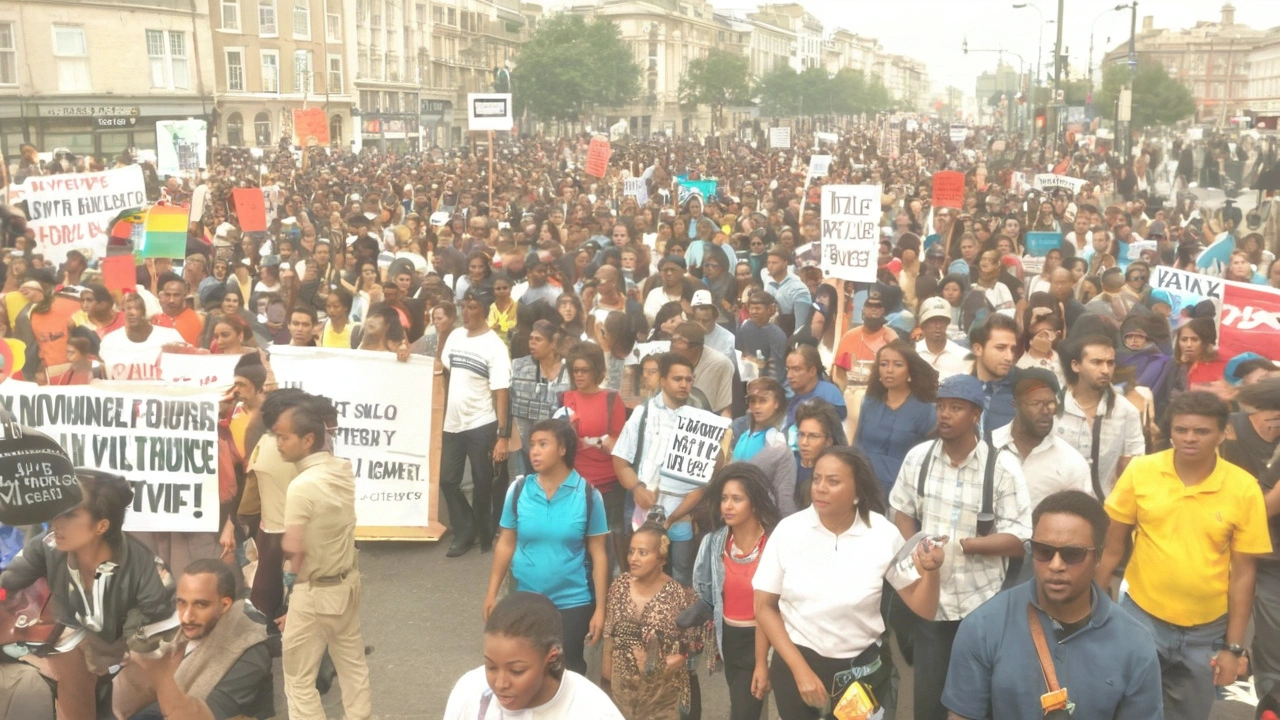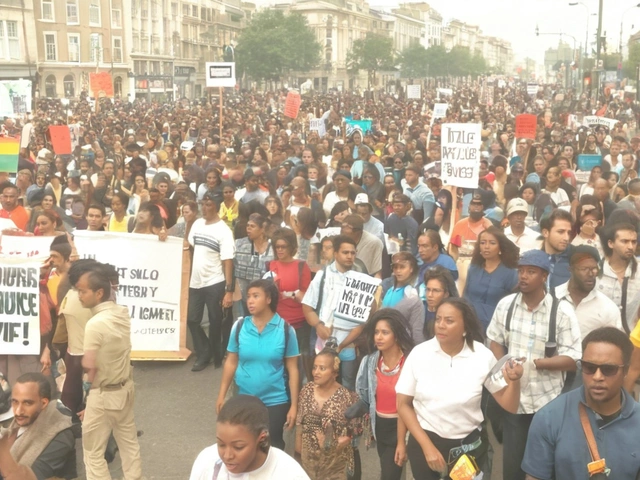Understanding the August 1 Protests in Nigeria
On August 1, Nigerians across the 36 states and the Federal Capital Territory are planning a large-scale demonstration, which could have significant implications for the nation's political landscape. These protests, driven by widespread dissatisfaction, will take place in various key locations including Eagles Square in Abuja, Alausa Park by Secretariat in Lagos, Rosewale Filling Station at Iwo Road in Ibadan, and Freedom Park in Osogbo, Osun State. Other notable venues span across cities such as Bauchi, Benin City, Maiduguri, Damaturu, and Rivers State.
Primary Locations of the Protest
The strategic choice of venues underscores the protesters' desire to ensure visibility and maximum impact. For instance, in Abuja, the protest at Eagles Square is expected to draw significant attention due to its political significance. Similarly, Alausa Park by Secretariat in Lagos, the commercial nerve center of Nigeria, is a strategic location likely to attract a large turnout. The protests in Ibadan at Rosewale Filling Station and Osogbo’s Freedom Park similarly point towards the careful planning involved in this movement. Spread across the nation, these venues symbolize a unified call for change from various regions and demographics.
Security Concerns and Police Involvement
In the lead-up to the protests, Nigerian police have made arrangements to manage the potential unrest. On the alert for possible violence, they arrested a suspect in Plateau State. Suleiman Yakubu, a 34-year-old man, allegedly incited violence against state infrastructure, law enforcement agencies, and private individuals. During interrogation, Yakubu reportedly confessed to appearing in a video where he encouraged attacks on petrol stations, security personnel, and other key assets in connection with the protest.
Olumuyiwa Adejobi, the Force Public Relations Officer, emphasized the importance of cooperation between protest organizers and the police. He called on them to share vital information such as contact details, routes, and schedules to ensure the safety of all participants and the general public. He also warned against unintended or unauthorized demonstrations, stressing that protesters should assemble at designated locations to benefit from police protection.
Legal and Societal Responses
While there is considerable support for the protests, some government and professional bodies have expressed concerns. The Nigerian Bar Association (NBA) has disassociated itself from the protests, though it acknowledged the legitimacy of peaceful demonstrations. The NBA stressed the importance of safety and adherence to the rule of law, urging all parties involved, including law enforcement, to prioritize these elements. They highlighted that the protesters must avoid actions that could escalate tensions or endanger public safety, reinforcing the imperative of a peaceful demonstration.
The overall societal sentiment is one of cautious optimism. Many Nigerians are hopeful that these protests can catalyze meaningful change, emphasizing the need for accountability and better governance. However, there is also an awareness of the potential for violence and civil unrest, prompting calls for calm and responsibility from all quarters.
Significance and Expected Outcomes
The August 1 protests are a critical moment for Nigeria. They reflect a broader national outcry for change and improved governance. Observers are keenly watching how the events will unfold and what impact they will have on the country's political dynamics. If conducted peacefully, the protests could serve as a powerful reminder of the people's voice and their demand for accountability from their leaders. Conversely, any outbreak of violence could undermine the cause and lead to a clampdown by law enforcement authorities.
Ultimately, the success of these protests hinges on the ability of the organizers and participants to maintain order and focus on their objectives. By adhering to legal guidelines and ensuring a peaceful demonstration, they can make a compelling statement that resonates both within Nigeria and internationally.
The Role of Social Media and Public Mobilization
In the modern age, social media plays a crucial role in mobilizing public opinion and organizing events. The August 1 protests have been no different, with various social media platforms being used to coordinate activities, share information, and rally support. The ubiquity of smartphones and internet access means that information can be disseminated quickly and widely, making it a powerful tool for protest organizers.
However, the use of social media also brings challenges. False information and inflammatory content can spread rapidly, potentially inciting violence or causing panic. It is therefore imperative for organizers and participants to verify information and avoid sharing unconfirmed reports. Responsible use of social media can help ensure that the protests remain peaceful and focused on their goals.
Government's Perspective and Response
The Nigerian government is well aware of the significance of the protests and is likely monitoring the situation closely. In the past, the government has had varied responses to protests, ranging from peaceful negotiations to more forceful crackdowns. The approach taken in response to the August 1 protests will be a litmus test for the current administration's stance on civil liberties and public dissent.
There are indications that the government is taking the protests seriously. The arrest of individuals inciting violence and the public statements by the police suggest that there is a concerted effort to manage the situation proactively. How the government balances the need to maintain public order with the rights of citizens to express their grievances will be critical in shaping public perception and trust in the leadership.
Voices from the Ground: Protesters' Demands
The demands of the protesters are varied, reflecting the complex socio-political landscape of Nigeria. Common themes include calls for better governance, accountability, and an end to corruption. Economic issues, such as job creation, inflation, and access to basic amenities, are also high on the list of grievances. The protests provide an opportunity for citizens to voice their dissatisfaction and call for a change in their living conditions.
Many protesters believe that sustained public pressure is necessary to bring about meaningful change. They argue that previous protests may have been too short-lived or lacked the necessary follow-through to achieve their goals. As such, there is a determination among many participants to keep the momentum going and ensure that their voices are heard.
Conclusion: The Path Forward
As August 1 approaches, all eyes will be on Nigeria to see how the protests unfold. The potential for these demonstrations to effect change lies in their ability to remain peaceful, organized, and focused. By working with law enforcement and adhering to legal guidelines, protesters can make a powerful statement while minimizing the risk of violence and unrest.
The coming days will be crucial in determining the direction of these protests and their impact on the nation's future. As citizens gather to demand a better Nigeria, the principles of peace, responsibility, and mutual respect must guide their actions. This moment represents a significant chapter in Nigeria's ongoing struggle for accountability and good governance, and its legacy will depend on how it is written.


